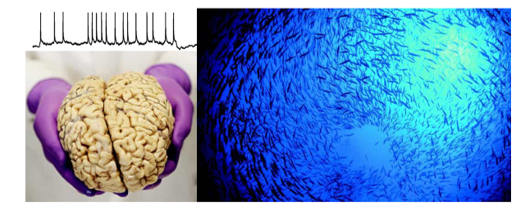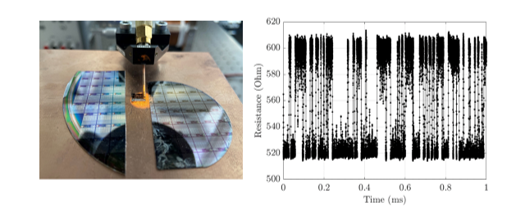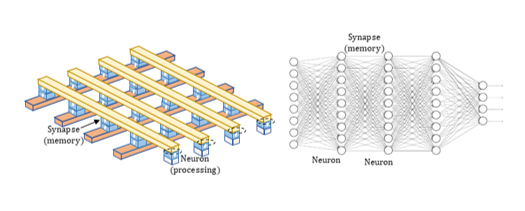Overview
The transversal team aims at bringing together all competencies from SPINTEC involving spintronic devices nanofabrication, characterization, circuit integration, architecture, and algorithm techniques to implement hardware solutions for artificial intelligence (AI) and unconventional computing.
Spintronic-based multifunctional devices are a substantial opportunity to improve the energy efficiency of next-generation computing hardware. Moreover, this approach allows taking advantage of brain-inspired computing models to deploy cutting-edge neuromorphic algorithms, crossing the gap between current hardware AI implementations and exceptional brain computing ability.
Research topics
Bio-inspired computing

As the brain performs very sophisticated operations and consumes only a few Watts, brain-inspired/neuromorphic computing is a promising path for which spintronic devices can efficiently emulate both neurons and synapses in hardware. Their nanometric size, sensitivity to input stimuli, and interactions make those devices ideal for implementing large arrays of neuro-synaptic elements: spintronic nano-oscillators, spintronic and ferroelectric memristors, magnetic memories, superparamagnetic tunnel junctions, skyrmions, etc.
Probabilistic computing

Noise is a crucial ingredient in emulating the stochastic nature of the neural activity and executing energy-efficient computing algorithms such as energy-based or temporal-based machine learning models. In this context, probabilistic computing is a very suitable approach that relaxes usual precision computing constraints. The truly random nature of spintronic devices (such as superparamagnetic tunnel junctions) makes them attractive for hardware implementations of probabilistic computing approaches.
In memory computing

The most promising solutions for non-Von Neumann, in-memory computing architectures are based on the use of emerging technologies, that are able to act as both storage and information processing units thanks to their specific physical properties. High accuracy, Deep neural networks (DNN) can be built with crossbars analog in memory computing concept, involving MRAM families, such as STT, SOT, VCMA, but also with more exotic families of magneto-resistive, and ferroelectric or skyrmion based devices.
The team
Projects
Partners
- CEA LIST
- UMPHY
- CEA LETI
Recent news
- PhD Defense – Leveraging Stochastic properties of Spintronic Nanodevices for Unconventional Computing (January 21st, 2025)

On Tuesday 4th of February, at 9:00, Nhat-Tan PHAN (SPINTEC) will defend his PhD thesis entitled : Leveraging Stochastic properties of Spintronic Nanodevices for Unconventional Computing Place : IRIG/SPINTEC, CEA Building 10.05, auditorium 445 (presential access to ... - Thermal noise, binary phase states and how this can be used for data encryption (October 29th, 2024)

Unbiased random bitstreams are essential for encryption, secure communication, and unconventional computing, yet true randomness without bias remains challenging in hardware. By harnessing nanoscale thermal magnetization fluctuations in spintronic nano-oscillators, the AI and RF teams ... - PhD Defense – Study of Multilevel Emerging Non-Volatile Memories for In-Memory Computing and FD-SOI-Based Analog SNNs (October 14th, 2024)

On Wednesday 23th, at 15:00, Joao Henrique Quintino Palhares (SPINTEC) will defend his PhD thesis entitled : Study of Multilevel Emerging Non-Volatile Memories for In-Memory Computing and FD-SOI-Based Analog SNNs Place : Salle des Conseils (7ème ... - PhD Defense – Design and reliability study of crossbar circuits based on multilevel spintronic devices for Artificial Intelligence (October 03rd, 2024)

On Thursday October 17th, at 14:00, Kamal Danouchi (SPINTEC) will defend his PhD thesis entitled : Design and reliability study of crossbar circuits based on multilevel spintronic devices for Artificial Intelligence Place : Phelma, amphi M0001 video conference ... - seminar – Novel information encoding schemes for energy efficient cognitive computing (April 05th, 2024)

On Monday, April 29th 2023, we have the pleasure to welcome in SPINTEC Advait Madhavan from University of Maryland. He will give us a seminar at 14:00 entitled : Novel information encoding schemes for energy efficient ...







